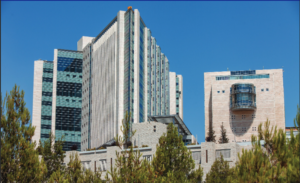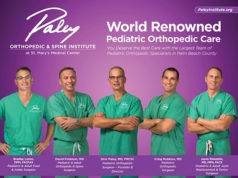The history of Israel’s largest hospital began with the initiative of the Secretary of the Federation of American Zionists, Henrietta Szold, who founded the Hadassah Zionist women’s organization in 1912. Henrietta Szold knew that the inhabitants of the Promised Land need their own health care system, so Hadassah activists began to provide medical services. In 1913, Hadassah sent two midwives to Palestine. They opened a small station to assist young mothers and treat trachoma, which was very common in the Middle East. In 1914, the First World War began, however, despite the difficulties, Hadassah continued to admit patients.
In 1918, the organization opened its first medical service and began financing the creation of hospitals, medical schools, and dental clinics throughout the country. In 1919, Hadassah built hospitals in Tel Aviv, Jerusalem, Tiberias, Haifa, and Safed. Subsequently, all hospitals except the two Jerusalem hospitals under Hadassah guidance — Hadassah Ein Kerem and Hadassah Har HaZofim (a complex on Mount Scopus) — were transferred to the municipal authorities.
Today, Hadassah is one of the largest medical centers in the Mediterranean region. Its students undergo practical training in five medical schools, in addition, Hadassah is the research base of the medical faculty of the Hebrew University. There are research institutes of oncohematology, neurology, genetics, and other branches of medicine. Hadassah is internationally known as a leader in the development and implementation of new treatment protocols, drugs, methods, and medical technologies. Doctors of the clinic often go to provide charity care to places of major earthquakes, epidemics, and zones of armed conflicts. The hospital is constantly expanding with new buildings constructed and additional units and laboratories.
Unique diagnosis and treatment in Hadassah
Video for the article to this block: https://youtu.be/3mI-v4_J5dA Сaption: Hadassah changes lives of people around the world
Cancer treatment
One of the highest priority areas in Hadassah is oncology. If cancer is suspected, the clinic uses the most modern and accurate diagnostic methods, such as the genetic tests InVitae, Caris Target Now, Foundation One, his
Since its establishment, Hadassah’s staff has followed the fundamental principle: the clinic works for the benefit of all its patients, regardless of racial or religious differences.
tological studies, and the latest MRI, CT, and PET-CT methods. All the advanced oncological treatment methods are used here, such as all types of chemotherapy with minimal side effects, including intraoperative HIPEC therapy, hormone therapy, targeted therapy,
immunotherapy, bone marrow and stem cell transplantation, HIFU technique, electro-, cryo- and laser destruction, etc.
Hadassah did not confirm about 34% of all oncological diagnoses of other clinic
Innovations
- Last year, Hadassah presented the only supersensitive PET-CT device in Israel, able to detect tumors 2-3 mm in size, which was impossible before the commissioning of the innovative unit.
- The clinic offers exclusive radiotherapy using the ultra-precise Novalis TrueBeam Stx device, which reduced the duration of the course by 30-50%.
- For the first time in Israel, Hadassah oncologists have begun using NanoKnife technology to remove localized prostate cancer.
- Hadassah treats neuroendocrine tumors using advanced Peptide Receptor Radionuclide Therapy (PRRT) technology. This therapy is 2-3 times more effective in the clinic than in oth er Israeli medical centers because only here the radioactive material for therapy is produced directly in the hospital campus and is used immediately.
- The clinic has cured more than 200 patients with metastatic melanoma who were declared hopeless in other medical centers. The treatment was carried out using a unique vaccine developed by Professor Michal Lotem.

Video for the article to this block:https://youtu.be/qhNriiphznUVideo
Сaption: Stuart Greenberg came to Hadassah with a diagnosis of fourth-degree melanoma with metastases in the stomach. Doctors in the United States said that he had only a few months left to live, but they saved his life in Hadassah.
Treatment of rare genetic diseases using BMT
Patients from all over the world come to Hadassah to see the doctors of the bone marrow transplantation unit, recently JACIEaccredited Professor Polina Stepensky and Dr. Irina Zaydman. Under their guidance, the clinic conducted more than 3,500 successful transplants, more than 30% of which accounted for children. Polina Stepensky often works with small patients from Russia. If necessary, parents are assisted in applying to charitable foundations for financial support of treatment. In Hadassah, a multidisciplinary team of specialists takes care of small patients: oncologists, hematologists, nurses, psychologists, teachers, and medical clowns. In order to avoid infectious complications, children are placed in special aseptic units.
Neurosurgery
In July 2018, Hadassah neurosurgeons were the first in Israel to use the world's most powerful KINEVO 900 surgery microscope, created by the famous German company – Zeiss. The device makes visible the smallest tumors and vessels in 3D; it has significantly boosted Israeli neurosurgery. Hadassah is the only medical facility in the Middle East providing treatment of stroke patients over 80 years of age. In January 2018, a 99-year-old patient underwent a similar operation. Hadassah neurosurgeons treat newborns, starting from their very birth, and elderly people of almost any age: the age of 99 years has so far been a record, but, according to Professor Jose Cohen, 100 years is not the limit.
“Few people know that many advanced technologies are being introduced in Israel – in Hadassah – earlier than in the US because we do not need permission from the FDA – the US regulatory system – but only EU per mission. Hadassah is a hospital that operates as an American structure and organization, with European regulations and a foundation, and the Judaism values. Jewish morality, the most advanced technology in the world, and the American-type administration". Professor Jose Cohen is the Head of Branch of Interventional Neuroradiology. His work and scientific activity was repeatedly marked by honorary awards, the first persons of the states trust their health to Jose Cohen, pa tients from dozens of countries around the world seek his care. Professor Cohen has no equal in the treatment of cerebral aneurysms and strokes.
Orthopedics
Last year, Hadassah became the first clinic in the Middle East to apply the latest spine metastases radiotherapy technology – Spine SRS. Spine SRS software ensures a 3-4-time increase in the accuracy of radiotherapy, which reaches a record level of less than 1 mm. As a result, it is possible either to completely replace the surgical intervention with radiation therapy, or to conduct a small operation.
Hadassah was the first in Israel to use a combination of BRAINLAB's innovative navigation system and ZEEGO’s advanced imaging device to remove hard-to-reach tumors. Only thanks to this, the orthopedists managed to replace the difficult and dangerous intervention with a minimally invasive operation when removing a benign tumor located on the femur of a 27-year-old patient.




